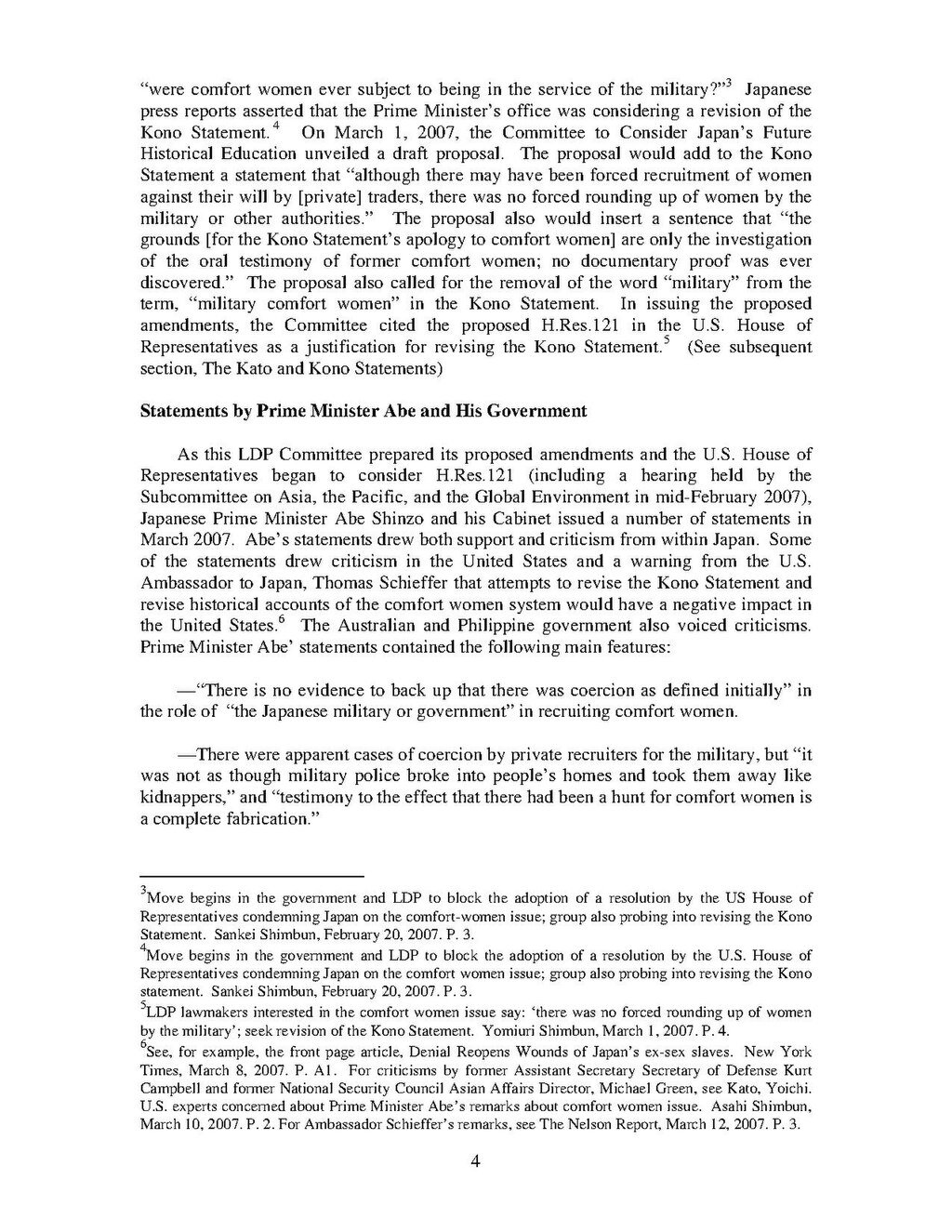“were comfort women ever subject to being in the service of the military?”[1] Japanese press reports asserted that the Prime Minister’s office was considering a revision of the Kono Statement.[2] On March 1, 2007, the Committee to Consider Japan’s Future Historical Education unveiled a draft proposal. The proposal would add to the Kono Statement a statement that “although there may have been forced recruitment of women against their will by [private] traders, there was no forced rounding up of women by the military or other authorities.” The proposal also would insert a sentence that “the grounds [for the Kono Statement’s apology to comfort women] are only the investigation of the oral testimony of former comfort women; no documentary proof was ever discovered.” The proposal also called for the removal of the word “military” from the term, “military comfort women” in the Kono Statement. In issuing the proposed amendments, the Committee cited the proposed H.Res. 121 in the U.S. House of Representatives as a justification for revising the Kono Statement.[3] (See subsequent section, The Kato and Kono Statements)
Statements by Prime Minister Abe and His Government
As this LDP Committee prepared its proposed amendments and the U.S. House of Representatives began to consider H.Res.121 (including a hearing held by the Subcommittee on Asia, the Pacific, and the Global Environment in mid-February 2007), Japanese Prime Minister Abe Shinzo and his Cabinet issued a number of statements in March 2007. Abe’s statements drew both support and criticism from within Japan. Some of the statements drew criticism in the United States and a warning from the U.S. Ambassador to Japan, Thomas Schieffer that attempts to revise the Kono Statement and revise historical accounts of the comfort women system would have a negative impact in the United States.[4] The Australian and Philippine government also voiced criticisms. Prime Minister Abe’ statements contained the following main features:
—“There is no evidence to back up that there was coercion as defined initially” in the role of “the Japanese military or government” in recruiting comfort women.
—There were apparent cases of coercion by private recruiters for the military, but “it was not as though military police broke into people’s homes and took them away like kidnappers,” and “testimony to the effect that there had been a hunt for comfort women is a complete fabrication.”
- ↑ Move begins in the government and LDP to block the adoption of a resolution by the US House of Representatives condemning Japan on the comfort-women issue; group also probing into revising the Kono Statement. Sankei Shimbun, February 20, 2007. P. 3.
- ↑ Move begins in the government and LDP to block the adoption of a resolution by the U.S. House of Representatives condemning Japan on the comfort women issue; group also probing into revising the Kono statement. Sankei Shimbun, February 20, 2007. P. 3.
- ↑ LDP lawmakers interested in the comfort women issue say: ‘there was no forced rounding up of women by the military’; seek revision of the Kono Statement. Yomiuri Shimbun, March 1, 2007. P. 4.
- ↑ See, for example, the front page article, Denial Reopens Wounds of Japan’s ex-sex slaves. New York Times, March 8, 2007. P. A1. For criticisms by former Assistant Secretary Secretary of Defense Kurt Campbell and former National Security Council Asian Affairs Director, Michael Green, see Kato, Yoichi. U.S. experts concerned about Prime Minister Abe’s remarks about comfort women issue. Asahi Shimbun, March 10, 2007. P. 2. For Ambassador Schieffer’s remarks, see The Nelson Report, March 12, 2007. P. 3.
4
